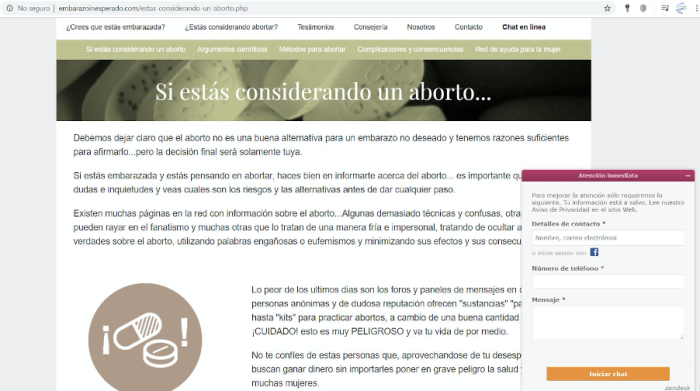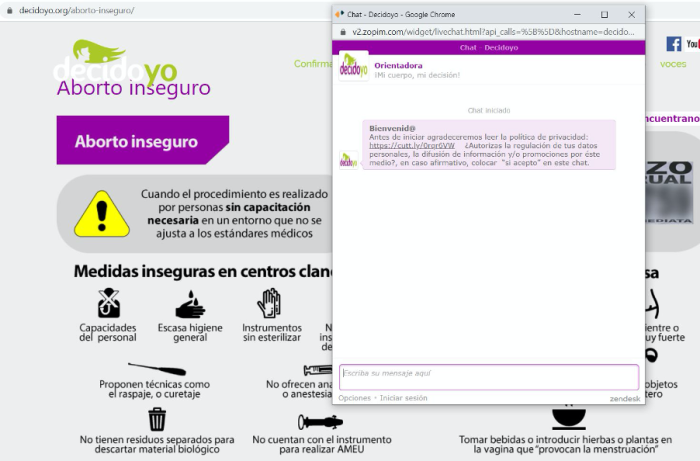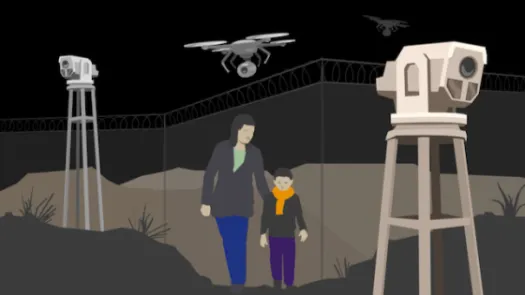
Country case-study: sexual and reproductive rights in Peru
This country case-study was informed by research carried out by Hiperderecho.
- There is no universal right to abortion in Peru, and women seeking abortion outside the legally established exceptions are liable to prosecution
- Anti-abortion organisations and their representatives are embedded in political parties and legislative bodies
- Some anti-abortion online platforms are designed to collect user data, but fail to provide a privacy policy

1. What are the barriers to access safe and legal abortion?
2. What are the barriers to access basic contraception?
3. What are the hurdles in accessing non-biased medical reproductive health information?
4. What are the concerns regarding the use of technology by anti-abortion organisations?
5. What foreign organisations have a large anti-reproductive rights presence?
This research was commissioned as part of Privacy International’s global research into data exploitative technologies used to curtail women’s access to reproductive rights. Reproductive Rights and Privacy Project. Read about Privacy International’s Reproductive Rights and Privacy Project here and our research findings here.
1. What are the barriers to access safe and legal abortion?
Abortion has been historically considered a crime in Peru. The current law (1) criminalises both the mother who practices or consents to abortion, as well as the person who executes it. The mother can be made to serve up 2 years in prison, while those who provide the abortion can be imprisoned for up to 4 years. There are some exceptions: therapeutic abortion (2) has been decriminalised since 1924 and it can be legally performed in two scenarios: a) when it is the only means to save the pregnant woman's life; or b) to avoid serious and permanent damage to her health. However, the protocol to perform therapeutic abortion in public and private health centers was only enacted in 2014 – almost a century after the law was passed – and the act of performing a therapeutic abortion still faces different legal, social and political hurdles.
Since abortion is a crime in Peru, the women who decide to have an abortion have to resort to illicit methods such as the purchase of abortion pills such as Misoprostol or go to clandestine abortion clinics. In both cases they put their health and life at risk. Additionally, in cases where a woman has performed an abortion and has complications for which she seeks treatment in a health center, those who look after her are legally compelled to report her to the police if they suspect that an induced abortion has taken place. This obligation overrides doctors' right to professional secrecy in a doctor-patient relationship (3).
Even though this law is controversial, and that there are currently no protocols that specify what the obligations require, doctors can choose not to report the patient. However, this decision represents a risk to them because they could be involved in a criminal prosecution along with the woman accused for abortion and, if found guilty, lose their licenses to practice medicine. Despite the fact that in 2004, the Inter-American Court of Human Rights in the De la Cruz Flores vs. Peru case noted that doctors are not obliged to report crimes to the authorities, health personnel are still required to report under the application of Law 26842, at least in the case of abortion. Given this dilemma, some will choose to suppress the medical history of the women they treat, skewing the numbers that indicate how many women are receiving abortion in Peru, while others will prefer to accuse women before risking their own licenses.
2. What are the barriers to access modern contraception?
Current laws require the State to distribute different contraceptive methods free of charge. Those currently delivered are: male condoms, female condoms, regular contraceptive pills, subdermal implants, intrauterine devices, contraceptive injections,tubal ligation and vasectomy. However, these are not fully accessible due to factors such as lack of education, religious and social reasons, lack of resources to go to the centers where they are distributed, discrimination, and others.
Although the distribution of free contraception methods and their free circulation in the market are part of the State's policies based on the aforementioned laws and their derived regulations, in Peru emergency contraceptive methods such as the morning after pill faced strong opposition from public and private actors for many years. For example, in 2009, the Constitutional Court declared that this method was abortive, accepting the theory that ‘Life Begins at Fertilization’. However, in 2019 this sentence was reversed as a new interpretation was accepted, taken from the Artavia Murillo v. Costa Rica case of the Inter-American Court of Human Rights, where it was found that life begins at the nesting stage, and therefore the morning after pill is not abortive.
Education plays also an important part in ensuring that modern contraception is sought In Peru, although private education institutions are required to comply with the National Curriculum of Education (a compilation of subjects and contents that are mandatory for the different levels of education), they retain enough agency to choose the approach and the books they use. For instance, even when Biology is a mandatory subject, some private schools affiliated to catholic or evangelist institutions include religious-based concepts in this subject like “The Intelligent Design”.
Equally, in the case of reproductive rights, some of these books promote abstinence as a contraceptive method and discourage sex before marriage. These perspectives are concerning considering that, according to recent research, only 8% of Peruvian teachers teach comprehensive sex education and only 21% of school children received information on these topics at school. Contraception and unplanned pregnancy remain among the least covered areas in sex education classes, with 85% of school children reporting they are learning about sexuality online.
3. What are the hurdles in accessing non-biased medical reproductive health information?
Although the State and different private actors work to make reproductive health information accessible, there are other actors that seek to create misinformation or promote ignorance about these issues as part of their religious or political agendas. The most common disinformation elements focus on i) contraceptive methods and ii) abortion.
Current disinformation campaigns mainly aim to discredit the State's efforts distributing contraceptive methods free of charge. The campaigns suggest these methods are “abortive” and recommend "natural" contraceptive methods, such as the fertility awareness method or abstinence, as a better option compared to "artificial" ones. The effectiveness of these campaigns is not known but in general these are directed to their own communities (evangelical churches, catholic churches, anti-abortion groups, etc.)
There are three types of misinformation campaigns:
Discrediting contraceptive methods as abortive
Human Life International, an international religious pro-life organization based in the United States labels contraceptive methods like the morning after pill, subdermal implants and intrauterine devices as “abortives” with no evidence, only quoting the controversial theory (not recognized currently in Peru) that life begins at fertilization.
Promoting "natural contraceptive methods"
Some media outlets provide misinformation about “natural methods of birth control” such as abstinence and the Billings ovulation method. None of them are contraceptive methods listed by the World Health Organisation, but are instead labelled as natural family planning because they are not used to prevent pregnancy but to identify fertility periods.
Promoting illegal and unsafe surgical abortion services
These campaigns are run by businesses seeking to capture and misinform women who are trying to learn about their options. One of the best-known examples in Lima is Atraso Menstrual, a site that offers surgical abortion services but in fact is a scam to offer clandestine and unsafe abortion services. In the past you could find the contact information of Atraso Menstrual on lamp posts or on the sidewalk, but now they rely on websites and social media accounts to promote their services.
This is a direct quote from the website of Atraso Menstrual:
Don’t waste more time!
REGULARIZE YOUR PERIOD
If you have a menstruation delay, do not hesitate to contact us. We regulate menstruation instantly, painlessly and safely for your health. You can make your queries online through our Facebook page. SAFE SOLUTION.
When they say “We regulate menstruation instantly” they are referring to abortion services. The problem is that they also say that these services will be delivered “painlessly and safely” but commonly this is not the case. Currently, there are no official figures of how many women use these clandestine and unsafe services, but it is estimated that each year it causes 28,652 hospitalizations and 58 deaths. Furthermore, given that abortion is illegal in Peru, the doctors or those who work in these offices can commit negligence, abuse, and scams with total impunity knowing that their business is safe because women cannot report them.
4. What are the concerns regarding the use of technology by anti-abortion organisations?
In Peru, we find that the majority of content in favor or against reproductive rights, including abortion, is audiovisual content produced by individuals, organizations or groups of Peruvian citizens who use social networks for dissemination. Some of these actors are volunteers, but in the case of organizations, these activities may be funded by third parties.
Technology is so far not being used to invade privacy or conduct sophisticated data-mining by anti-reproductive groups. In addition to the processing of data that could be made through the use of cookies, voluntary subscriptions to mailing lists and contact forms, we have not found evidence that anti-abortion organisations are deploying technologies such as applications, online chats or other types of data collection mechanisms.Similarly, we did not find that the privacy of users who accessed anti-abortion websites was compromised, mainly because the contents are publicly accessible.
However, data collection can occur through cookies or contact forms. Of all the anti-reproductive websites reviewed, none have a page about their Privacy Policies (regarding cookies or other means of data collection) which is a Data Protection Law infringement. This was also the case for anti-abortion websites with contact forms and online chats, which often require personal information to be submitted before enabling the user to initiate a conversation. If these websites collect or process personal data, they are committing different violations against the Law and could be fined by the Data Protection Authority.
This online chat requires a name, phone number and the option to access using Facebook account but there is no page to be informed of the Privacy Policy even when the welcome text reads “Your information is safe. Read our Privacy Notice on the website.”
Conversely, all websites in favour of reproductive rights surveyed were found to include Privacy Policies. An example is set out below.
This online chat provides a link to the Privacy Policy and asks the user to type out and submit their consent before proceeding to the conversation.
Frontline organizations are concerned that women who seek information on reproductive rights are not aware of digital security or data privacy issues. Two organizations approached by Hiperderecho - Serena Morena and Colectiva por la Libre Información para las Mujeres - showed concern for the safety of their members and the women they support with information about abortion. The greatest risk of poor digital security practice identified is the possibility for information to fall into the hands of anti-abortion groups that may later retaliate. They mentioned how groups providing reproductive information on Facebook may not be safe because of their lack of digital security and data privacy precautions. They believe women who participate can later be persecuted or harassed by people who are against abortion.
CLIM expressed particular concern for women who consult about abortion but do not take adequate safety measures and provide their names, their addresses, their education establishment and the names of their partners when seeking information.
5. What foreign organisations have a large anti-reproductive rights presence?
Alianza Lationamericana para la Familia – ALAFA
Founded in Venezuela, this organization has an office in Lima. The Peruvian office is dedicated to the edition and printing of educational school texts where the use of contraceptive methods is discouraged, homosexual marriage is condemned, etc. These texts are currently used in different private schools in Peru (mainly schools affiliated or funded by evangelist churches), but some of them have also reached public schools.
Population Research Institute – PRI
Founded in 1989 in the United States as a Human Life International research institute, PRI became independent in 1996. The office for Latin America is based in Lima and has been at the forefront in the planning and funding of different anti-abortion movements in recent years, such as “Marcha por la Vida” (March for Life) against abortion and others against gender-inclusive policies in education such as “Con Mis Hijos No Te Metas” (Don’t Interfere with my Children). It is known that the members of this organization have political influence and lobby with public officials and congressmen due to independent investigations revealing lobbying by PRI members.
PRI is known to play a crucial role in the articulation, coordination and mobilisation of anti-abortion organisations in Peru, though the extent to which it funds them is unclear.
Opus Dei
Opus Dei, a Catholic organization founded in Spain, has had a chapter in Peru since 1953. It has acquired great prominence within the Peruvian Catholic Church and has significant influence in the politics of the country. This group is behind the creation of the Universidad de Piura, a Peruvian university that promotes its ideas. Several politicians and entrepreneurs are known to be affiliated to this institution, such as Martha Chavez (Congresswoman), Luis Solari (former Health Minister), Dionisio Romero Seminario (former chief of Grupo Romero and the second richest man in Peru).
(1) See Penal Code, articles 114 to 120.
(2) See Penal Code, article 119.
(3) See Law No. 26842 "General Health Law", article 30.





